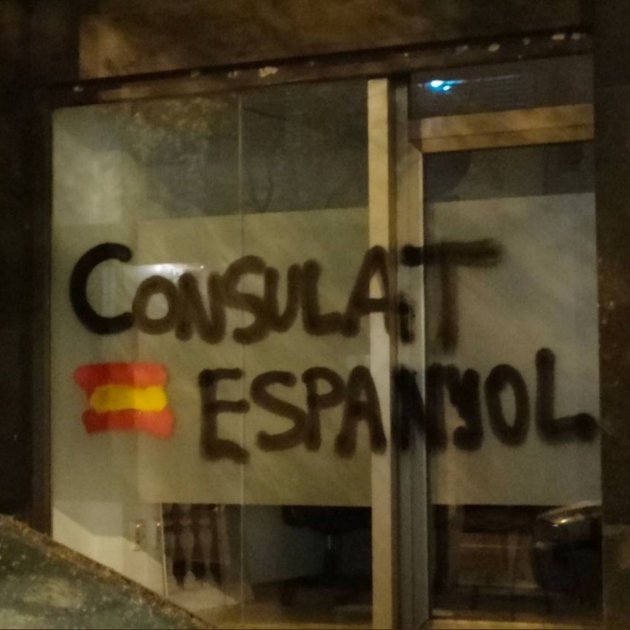The CDR-Direct Action group has claimed responsibility for spray-painting the same slogan on the façades of offices of the ERC, Junts and CUP political parties in several locations in Catalonia: "Spanish Consulate". The reason: what it considers inaction by these three parties, which have supposedly led the independence process, in returning to that path. CDR-Direct Action has explained on its website how the graffiti was painted in several towns and cities, including Barcelona, Rubí, Sant Cugat del Vallès and Vic. "If you continue to manage Spanish regionalism, you will find us confronting you. If you continue to betray independence, we will continue pointing that out on your headquarters. Today we make official what everyone knew: there are new consulates in the territory," they said on social media. In a manifesto published a year ago, CDR-Direct Action criticized the behaviour of the pro-independence parties, assuring that they are "seeking demobilization", and announced that it would carry out protest actions.
Meanwhile, the pro-independence parties, in addition to the PSC and the Comuns, are now awaiting the next move on the plan to change Catalonia's language policy law, in response to the court ruling imposing a quota of 25% Spanish language in Catalan classrooms. Last Thursday, the PSC, Comuns and the two largest pro-independence parties - ERC and Junts - confidently presented an agreement to incorporate Spanish as a language for school use, as a way of defending Catalan as "the centre of linguistic gravity" in schools, but the future of this accord is now in doubt, following widespread rejection from civil society. Junts withdrew its support from the agreement, for which it was criticised by the other three groups. The debate on the amendment to the Language Policy Act was due to begin next week, but now it has no date, although it is likely to be addressed in the session of April 28th.
Manifesto opposes "backward step"
On the other hand, ninety leading personalities have signed a manifesto against the language agreement, arguing that "it must not be passed because it constitutes a threatening step backward for the future of the language in an area that is key in its normalization". In addition, "the explicit incorporation of the vehicular language status of Spanish in a Catalan law would represent a step backwards that Catalan cannot afford in its current situation of weakness, which is especially accentuated among the younger population," it adds. Clara Ponsatí, Elisenda Paluzie, Quim Torra and Lluís Llach are some of the figures who supported the text released this week.
"We already know, as we have seen in the Valencian Country, that the courts, based on lawsuits from public and private bodies that have not stopped, would continue to attack the school in Catalan under any pretext," asserts the text. Therefore, it insists that "the Catalan government cannot give in to the legal challenge that, without any pedagogical criteria, seeks to overthrow a model that promotes social cohesion and has the support of the vast majority of society." "In fact, it gave way in 2020, when in the negotiation of its support for Spain's new education law, the Celaá Law, with the government of Pedro Sánchez, it did not demand as a condition that the Spanish government withdraw the appeal that has ended up giving rise to this ruling," he said. The court ruling on the appeal was given two days before the final voting on the education bill.
